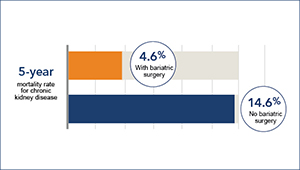Eric A. Johnson, MS
Biography
Eric Johnson, MS, completed the University of Washington’s biostatistics master’s program in 2008. His thesis explored common theoretical problems involved with missing data. He quantified them, highlighting conditions leading to suboptimal performance, and provided new guidelines for using various multiple imputation techniques.
During his time at KPWHRI, Mr. Johnson has been involved with multiple projects involving direct intervention with the care-delivery system, observational studies and microsimulation modeling on colorectal and ovarian cancer, massage therapy, and estimating radiation exposure from medical imaging. His current responsibilities lie in research on obesity, opioids, and mental health.
Before earning his master’s degree, Mr. Johnson worked for four years as a research assistant on the Multi-Ethnic Study of Atherosclerosis (MESA), performing statistical analyses, verifying incoming data, and developing a process for providing data sets to all MESA researchers. Later, he was a research statistician with the Department of Veteran Affairs (VA), serving as the primary analyst in an investigation of how well VA hospitals performed non-cardiac surgeries. Mr. Johnson assessed statistical models used by the National Surgical Quality Improvement Program—then devised, tested, and implemented improved models, reporting his findings to VA leadership.
Research interests and experience
-
Biostatistics
Multiple imputation; prediction models, working with large data
-
Health Systems
Implementing prediction models, and validating that they work as intended. Research into interventions that are financially feasible for health systems to widely implement
-
Cancer
-
Complementary & Integrative Health
-
Health Services & Economics
-
Obesity
-
Mental Health
Recent publications
Simon GE, Wellman R, Shortreed SM, Johnson E, Sterling SA, Coleman KJ, Ahmedani BK, Yaseen ZS, Mosholder AD Predicting and differentiating opioid and non-opioid drug poisonings using health records data 2025 Dec 22;182:209861. doi: 10.1016/j.josat.2025.209861. Epub 2025-12-22. PubMed
Lee CS, Su YR, Walker RL, Krakauer C, Blazes M, Johnson EA, Cronkite D, Bowers W, Hess C, Arterburn D, Agrón E, Chew EY, Crane PK A Novel AMD Severity Scoring System Leveraging the AREDS Studies and Routine Clinical Electronic Medical Records 2025 Oct;132(10):1076-1087. doi: 10.1016/j.ophtha.2025.04.026. Epub 2025-04-29. PubMed
Matson TE, Johnson E, Bobb JF, Graham V, Kiel L, Lee AK, Lapham GT, Caldeiro RM, Bradley KA, Angerhofer JE Implementing Care for Cannabis and Other Drug Use in Adult Primary Care: Outcomes of a Cluster-Randomized Implementation Trial 2025 Sep 16 doi: 10.1016/j.amepre.2025.108112. Epub 2025-09-16. PubMed
Simon GE, Shortreed SM, Johnson E, Ahmedani BK, Sterling SA, Campbell CI, Hechter RC, Ziebell RA, Parthasarathy S Risk of self-harm and overdose after starting buprenorphine for opioid use disorder 2025 Sep;96:90-96. doi: 10.1016/j.genhosppsych.2025.06.010. Epub 2025-06-24. PubMed
Simon GE, Ziebell RA, Johnson E, Shortreed SM Do health records data accurately identify repeat self-harm after emergency department visits? 2025 Jun 27 doi: 10.1101/2025.06.26.25330358. Epub 2025-06-27. PubMed
Arterburn D, Garcia R, Rosenberg D, Johnson E, Mettert K, Ng J, Brewer J Practical Awareness-Based Strategies for Eating (PASE): A Pilot and Feasibility Randomized Trial 2025 Feb;11(1):e70052. doi: 10.1002/osp4.70052. Epub 2025-02-12. PubMed
Penfold RB, Yoo HI, Richards JE, Crossnohere NL, Johnson E, Pabiniak CJ, Renz AD, Campoamor NB, Simon GE, Bridges JFP Acceptability of linking individual credit, financial, and public records data to healthcare records for suicide risk machine learning models 2024 Dec;7(4):ooae113. doi: 10.1093/jamiaopen/ooae113. Epub 2024-10-21. PubMed
Harrington LB, Benz L, Haneuse S, Johnson E, Coleman KJ, Courcoulas AP, Li RA, Theis MK, Cooper J, Chin PL, Grinberg GG, Daigle CR, Chang JH, Um SS, Yenumula PR, Getty JZ, Arterburn DE Bariatric Surgery and the Long-Term Risk of Venous Thromboembolism: A Population-Based Cohort Study 2024 Jun;34(6):2017-2025. doi: 10.1007/s11695-024-07236-y. Epub 2024-04-30. PubMed
Simon GE, Johnson E, Shortreed SM, Ziebell RA, Rossom RC, Ahmedani BK, Coleman KJ, Beck A, Lynch FL, Daida YG Predicting suicide death after emergency department visits with mental health or self-harm diagnoses 2024 Mar;87:13-19. doi: 10.1016/j.genhosppsych.2024.01.009. Epub 2024-01-22. PubMed
Simon GE, Shortreed SM, Johnson E, Yaseen ZS, Stone M, Mosholder AD, Ahmedani BK, Coleman KJ, Coley RY, Penfold RB, Toh S Predicting risk of suicidal behavior from insurance claims data vs. linked data from insurance claims and electronic health records 2024 Jan;33(1):e5734. doi: 10.1002/pds.5734. Epub 2023-12-19. PubMed
Research

Study finds bariatric surgery linked to substantially lower risk of blood clots long-term
Largest study to date helps patients weigh risks and benefits of surgery.
New findings

Simpler models to identify suicide risk perform similarly to more complex ones
Models that are easier to explain, use could have better uptake in health care settings.
New findings

Research roundup on natural language processing and machine learning
Using doctor's notes to learn about drug reactions, dementia, and cannabis use.
New findings

Is bariatric surgery helpful in chronic kidney disease?
David Arterburn and colleagues find that bariatric surgery is linked to lower death risk in persons with obesity and CKD.



